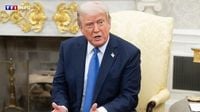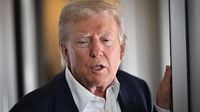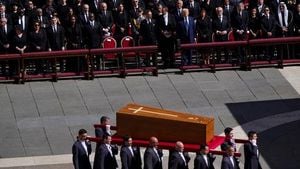As American President Donald Trump arrived in Rome on April 25, 2025, for the funeral of Pope Francis, he made headlines by declaring that Russia and Ukraine are "very close to an agreement." The statement, shared on his Truth Social platform, came amid ongoing tensions and negotiations surrounding the protracted conflict between the two nations, which has seen significant loss of life and territorial disputes.
Trump expressed optimism about the potential for peace, stating, "The two parties should now meet at the highest level to finalize the process." His comments suggest a belief that a resolution could be within reach, especially following a series of high-level discussions between American and Russian officials. He anticipated a "beautiful day of negotiations and meetings with Russia and Ukraine" during his visit.
Earlier that day, Trump had granted an interview to TIME magazine, where he reiterated his controversial stance on Crimea, asserting that it will "remain under Russian control." This claim has drawn sharp criticism, particularly from Ukrainian President Volodymyr Zelensky, who firmly opposes any recognition of Russian sovereignty over the peninsula, which was annexed in 2014.
Zelensky stated, "Our position remains unchanged... all temporarily occupied territories belong to Ukraine," underscoring the deep-seated tensions surrounding Crimea. This disagreement highlights the complexities of the negotiations, as Trump's acknowledgment of Crimea's status as "lost" for Ukraine complicates the peace talks.
The backdrop of these discussions includes a meeting between Trump’s emissary, Steve Witkoff, and Russian President Vladimir Poutine, which took place on the same day. Witkoff's visit marked the fourth meeting between the two since the unexpected resumption of relations in February, initiated by Trump. Iouri Ouchakov, a senior advisor to Poutine, characterized their discussions as "constructive and very useful," lasting three hours and focusing on potential direct negotiations between Russia and Ukraine.
Despite the positive rhetoric, the reality on the ground remains fraught with challenges. On April 24, 2025, a devastating Russian missile attack in Kiev resulted in the deaths of 12 civilians and injuries to 90 others, marking one of the deadliest attacks of the year. Zelensky condemned the attack, emphasizing that the missile used was manufactured in North Korea and contained components from American suppliers, raising questions about the implications of international arms sales.
In the wake of the attack, Trump urged Poutine to cease hostilities, stating on Truth Social, "Vladimir, STOP!" He expressed discontent with the timing of the strikes, which occurred just as diplomatic efforts were being ramped up. The president's call for a halt to the violence reflects his administration's ongoing attempts to mediate between the conflicting parties.
The situation is further complicated by the geopolitical dynamics at play. Danish intelligence recently accused Russia of orchestrating a disinformation campaign related to Greenland, suggesting that Moscow is actively seeking to undermine Western support for Ukraine. This revelation underscores the broader context of misinformation and propaganda that permeates the conflict.
As the world watches the developments unfold, the potential for a peace agreement remains uncertain. While both sides have expressed a willingness to negotiate, significant points of contention, particularly regarding Crimea and territorial integrity, continue to pose barriers to a lasting resolution. The mayor of Kiev, Vitali Klitschko, suggested that a temporary peace might involve difficult concessions, stating, "One of the scenarios... would be to abandon territories," though he emphasized that Ukraine would never accept an occupation.
In addition to the ongoing conflict, the World Bank has estimated that the reconstruction of Ukraine post-war will require over 500 billion dollars over the next decade. Ajay Banga, the president of the World Bank, highlighted the necessity of involving the private sector in these efforts, as the scale of reconstruction will be monumental.
As the funeral of Pope Francis approaches, the international community remains hopeful that the solemn occasion may provide an opportunity for dialogue and reflection on the path to peace. Zelensky has expressed uncertainty about his attendance, citing a tight schedule filled with military meetings. However, he assured that Ukraine would be represented appropriately, with the Minister of Foreign Affairs and the First Lady attending in his stead.
The stakes are high as leaders navigate the complexities of diplomacy in a region marked by conflict and historical grievances. With Trump’s unique position as a mediator, the world watches closely to see if his efforts can yield a breakthrough in the ongoing struggle for peace in Ukraine.
As discussions continue, the challenges of reconciling differing perspectives on territorial integrity, national sovereignty, and historical injustices loom large. The outcome of these negotiations will not only shape the future of Ukraine and Russia but will also have lasting implications for global security and international relations.





